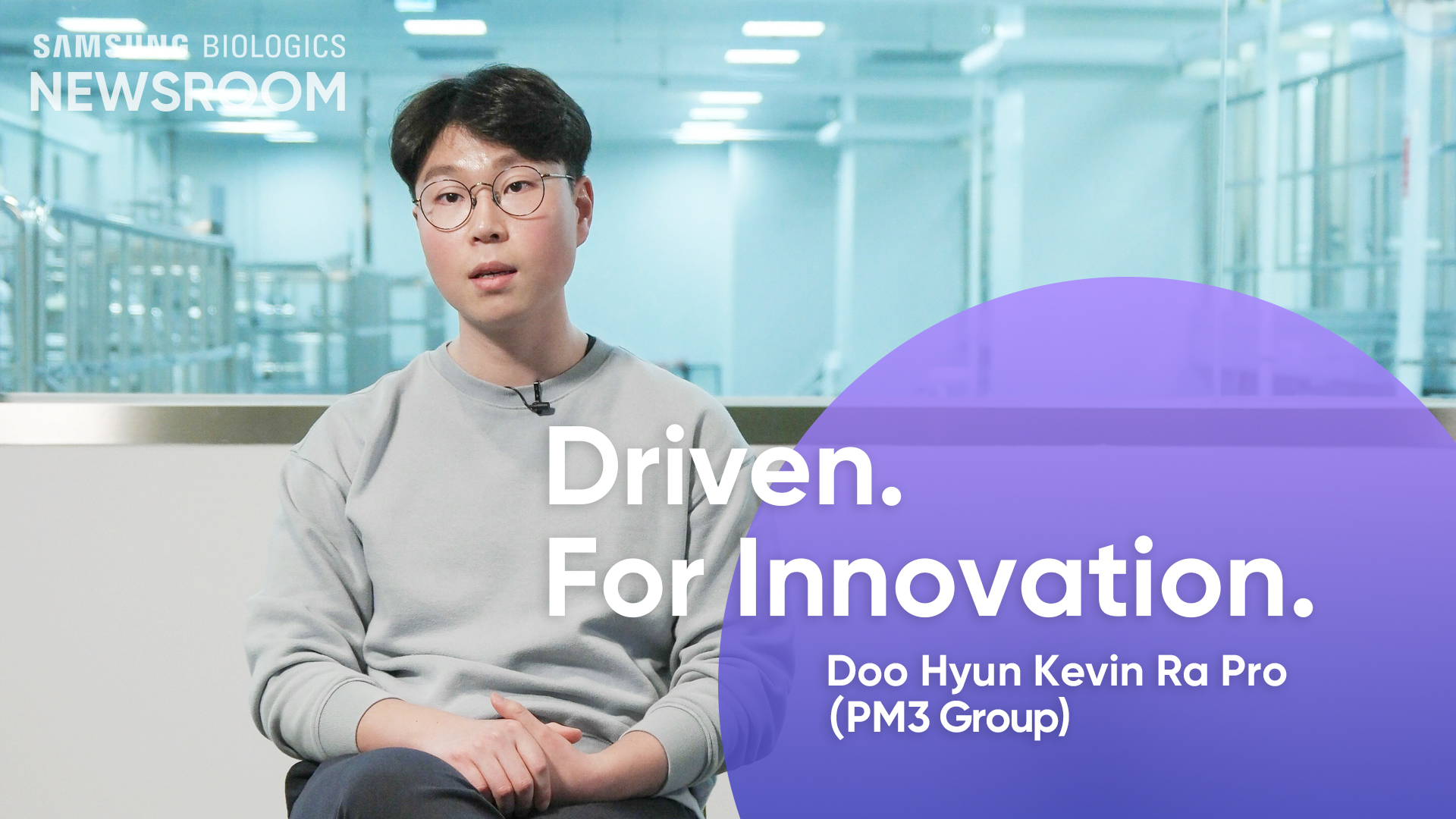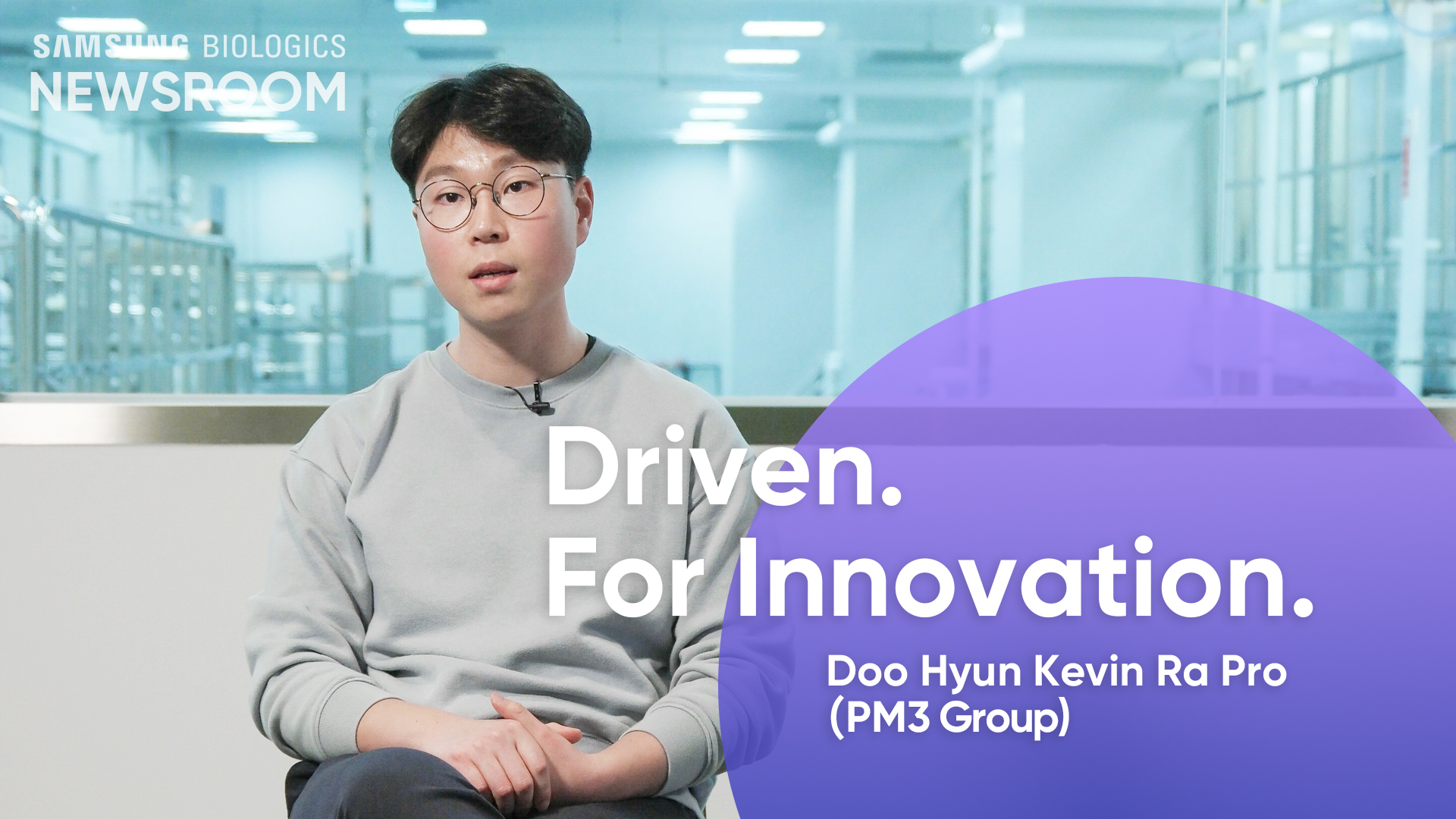
For Doo Hyun “Kevin” Ra, a project manager for PM3 Group which oversees technology transfer at Samsung Biologics, innovation is all in a day’s work. As a critical part of the successful development, manufacturing, and commercialization of a product, tech transfer requires careful planning, evaluation, and a bit of ingenuity to meet project timelines efficiently while maintaining high quality.
Samsung Biologics' innovative processes help our partners accelerate the global supply for COVID-19 antibody therapies. In addition to delivering an initial supply within five months of signing the contract, the team was then able to dramatically reduce the timeline for tech transfer to less than three months.
Kevin shares with us how the tech transfer team managed this extraordinary feat, as well as what being “Driven. For Life.” means to him.
What are your job responsibilities at Samsung Biologics?
As a project manager for tech transfer, I jump in right upon contract execution and schedule activities, see what the critical paths are, and come up with contingency risk mitigation plans. I also gather cross-functional teams and lay the groundwork for those teams to work together. You can consider my role as the main point of contact for any issues as well. We are at the forefront of client communications.
Can you give us any insight behind how the team shortened the tech transfer process from five months to three months? What was the most difficult part of this process?
Time was the critical obstacle for us to overcome. There were three key areas that we looked into when we went about expediting this tech transfer. First was thinking about a critical path, the second was establishing the contingency plans, and the third was developing seamless collaboration internally and externally. For the first part, in terms of critical path items, we focused on time—definitely RMs, CAPEX, manufacturing documents, and anything that has a longer lead time. We wanted to focus on whether we can get these on-site and on time, then develop contingency plans to mitigate risks. So we identified the critical path, found out the pain points, came up with solutions, and worked cross-functionally to execute those solutions. Most importantly, this would not have been possible without the diligent effort from cross-functional project members.
Why is this so unique?
When you think about tech transfer for a biopharmaceutical plant, we had our standard set at six months, but even that itself is very short. When we communicate that to clients, it's a surprise to them. So when we think about shortening that further, even like 50 percent to three months, that's extraordinary if you consider it in terms of industry standard, especially for large, 15kL commercial scale facilities. I think what's unique about Samsung is our ability to maintain quality while increasing speed, so we're not giving up anything…We're executing, delivering, and we're following all the quality measures to deliver results in a short amount of time.
When you hear the phrase " Driven. For Life.", what comes to mind?
“Drive” for me has two very distinctive meanings. The first is motivation. When you're motivated for something, you say the person has the drive for it. Drive also means power, or momentum. So we start with that motivation, and then we execute and deliver with drive, power, and momentum. It covers [everything] from the starting point to the endpoint where we need to deliver. And at the end of it, there's life! We're saving lives, and “Driven. For Life.” especially captures everything we stand for.
We've seen that our employees are driven to make the world better in many areas. Innovation especially plays a vital role in tech transfer. How are you driven to inspire innovation within the company and within your job?
Innovation is a very important word in all industries, but in terms of the biopharmaceutical industry, innovation is something that people want to be careful about, because of all the regulations and the impact that innovation could have when you’re deviating from the norm in any way.
I think what helped us within the organization and externally with our clients was our innovative way to execute projects within the boundaries. I think we were able to find the spaces where we could really capitalize, and find ways that could expedite things, while always keeping the quality measures in place.
What do you love most about working at Samsung Biologics?
I love the people and the impact that I can make in the world. To think that what I do every day will actually go out into the world to save lives and help those in need is pretty amazing. Working in this industry [and at Samsung], we have this drive that pushes you to realize your maximum potential. Because at the end of your day, your work, or your project—there's life.
Related Contents
Whitepapers Best Practices for Biopharmaceutical Technology Transfer

For Doo Hyun “Kevin” Ra, a project manager for PM3 Group which oversees technology transfer at Samsung Biologics, innovation is all in a day’s work. As a critical part of the successful development, manufacturing, and commercialization of a product, tech transfer requires careful planning, evaluation, and a bit of ingenuity to meet project timelines efficiently while maintaining high quality.
Samsung Biologics' innovative processes help our partners accelerate the global supply for COVID-19 antibody therapies. In addition to delivering an initial supply within five months of signing the contract, the team was then able to dramatically reduce the timeline for tech transfer to less than three months.
Kevin shares with us how the tech transfer team managed this extraordinary feat, as well as what being “Driven. For Life.” means to him.
What are your job responsibilities at Samsung Biologics?
As a project manager for tech transfer, I jump in right upon contract execution and schedule activities, see what the critical paths are, and come up with contingency risk mitigation plans. I also gather cross-functional teams and lay the groundwork for those teams to work together. You can consider my role as the main point of contact for any issues as well. We are at the forefront of client communications.
Can you give us any insight behind how the team shortened the tech transfer process from five months to three months? What was the most difficult part of this process?
Time was the critical obstacle for us to overcome. There were three key areas that we looked into when we went about expediting this tech transfer. First was thinking about a critical path, the second was establishing the contingency plans, and the third was developing seamless collaboration internally and externally. For the first part, in terms of critical path items, we focused on time—definitely RMs, CAPEX, manufacturing documents, and anything that has a longer lead time. We wanted to focus on whether we can get these on-site and on time, then develop contingency plans to mitigate risks. So we identified the critical path, found out the pain points, came up with solutions, and worked cross-functionally to execute those solutions. Most importantly, this would not have been possible without the diligent effort from cross-functional project members.
Why is this so unique?
When you think about tech transfer for a biopharmaceutical plant, we had our standard set at six months, but even that itself is very short. When we communicate that to clients, it's a surprise to them. So when we think about shortening that further, even like 50 percent to three months, that's extraordinary if you consider it in terms of industry standard, especially for large, 15kL commercial scale facilities. I think what's unique about Samsung is our ability to maintain quality while increasing speed, so we're not giving up anything…We're executing, delivering, and we're following all the quality measures to deliver results in a short amount of time.
When you hear the phrase "Driven. For Life.", what comes to mind?
“Drive” for me has two very distinctive meanings. The first is motivation. When you're motivated for something, you say the person has the drive for it. Drive also means power, or momentum. So we start with that motivation, and then we execute and deliver with drive, power, and momentum. It covers [everything] from the starting point to the endpoint where we need to deliver. And at the end of it, there's life! We're saving lives, and “Driven. For Life.” especially captures everything we stand for.
We've seen that our employees are driven to make the world better in many areas. Innovation especially plays a vital role in tech transfer. How are you driven to inspire innovation within the company and within your job?
Innovation is a very important word in all industries, but in terms of the biopharmaceutical industry, innovation is something that people want to be careful about, because of all the regulations and the impact that innovation could have when you’re deviating from the norm in any way.
I think what helped us within the organization and externally with our clients was our innovative way to execute projects within the boundaries. I think we were able to find the spaces where we could really capitalize, and find ways that could expedite things, while always keeping the quality measures in place.
What do you love most about working at Samsung Biologics?
I love the people and the impact that I can make in the world. To think that what I do every day will actually go out into the world to save lives and help those in need is pretty amazing. Working in this industry [and at Samsung], we have this drive that pushes you to realize your maximum potential. Because at the end of your day, your work, or your project—there's life.
Related Contents
Whitepapers Best Practices for Biopharmaceutical Technology Transfer
- CDO
- CGMP
- ADC
- Bio Campus
- IR
- CMO
Share article